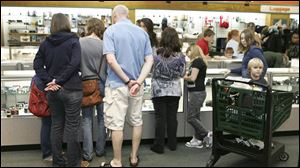
Alabama warehouse offers eager shoppers fliers' lost goods
4/24/2011
A display of electronics at Unclaimed Baggage Center in Alabama attracts a crowd of browsers.
SCOTTSBORO, Ala. -- Welcome to the final resting place for lost luggage.
Along a country road next to a muffler shop and a cemetery is a 40,000-square-foot store filled with items that never made it home.
Shoes, samurai swords, iPods, even lingerie, all available for 20 percent to 80 percent off.
When airlines can't determine who owns a bag, they sell it for a few bucks to the Unclaimed Baggage Center.
Past an entranceway of world clocks and columns decorated with foreign currency, one traveler's misfortune turns into a bargain-hunter's paradise.
"You never know what you may find," said Clayton Grider, a Scottsboro youth minister who often starts his day at the store. "It is a sport."
More than 2 million of the roughly 700 million suitcases checked on U.S. airlines last year didn't arrive with their owners.
The vast majority were returned within 24 hours, typically on the next flight. But 68,000 never made it.
After 90 days unsuccessfully trying to reunite passenger and parcel, most airlines sell the bags here. The inventory also include items left in seatback pockets.
"I feel sorry for the guy who lost it," says Chuck Trykoski, who bought a digital camera for $21. "I mean, I've lost stuff on the airlines too."
Each day, the store sets out 7,000 new items, including sweaters, jeans, golf clubs, books, and noise-canceling headphones. And it's not just luggage.
"It's kind of an archaeological snapshot of popular culture," said Bryan Owens, son of the store's founder and its owner since 1995.
It's "an adventure" for the 830,000 shoppers a year, said Owens, who wears a watch once found in a suitcase.
There have been some surprising discoveries over the years, including moose antlers, a parachute, a medieval suit of armor, a shrunken head. Only a third of the items received make it to the racks. The rest are donated to charity or are trashed.
Unclaimed Baggage was started in 1970 by Doyle Owens, a part-time insurance salesman in Scottsboro who had a friend who worked at a bus line in Washington. One day the friend asked if he wanted to buy lost luggage from buses. Four years later airline luggage was added. Since then, the store has expanded to car rental companies and commuter trains.
The airlines don't like to discuss how their customers' belongings end up here. American Airlines, Delta Air Lines, and United Airlines refused interviews. US Airways, JetBlue, and AirTran acknowledged they sell items in bulk -- sight unseen -- to the store but wouldn't say how much they are paid, citing confidentiality clauses in their contracts.
"It's not something that we make money off," said says Bill Race, who oversees luggage for JetBlue. "It's probably less than what you paid for lunch."
New York's Metro-North Railroad is paid $25 for each suitcase-size box of lost property. Big-ticket goods such as electronics or jewelry are sold for 30 percent of their value. Last year, Unclaimed Baggage paid Metro-North about $38,000 for about 5,000 items.
Other airlines -- Alaska, Frontier, Hawaiian, Southwest, Spirit, and Virgin America -- donate luggage to charities such as the Salvation Army.
Airlines vary in their records for losing bags. Southwest says one of every 67,000 bags checked is never reunited with its owner. Delta loses bags 13 times as often. Since the introduction of baggage fees, they're all doing better. The rate at which bags are delayed or mishandled is now half what it was in 2007. Experts say the fees -- airlines collect more than $3.3 billion a year -- deter passengers from checking bags, easing strains on the system.
For bags that lack identification tags, which can be ripped off during conveyer-belt jams, airlines inventory the luggage and use a database to match the contents with owners' descriptions. Investigators also look for other clues.
Bags that reach the Alabama store are opened and the contents are prepared for sale. Laptop and iPod memories are wiped clean and 40,000 pieces of clothing are laundered each month.
Some shoppers come just for the kitsch factor. Auburn University students Ryan Little and Jordan Haden walked out with a Will Smith CD, a Destiny's Child greatest-hits album, and a Mary-Kate and Ashley Olsen hair dryer. Total cost: $13.76.